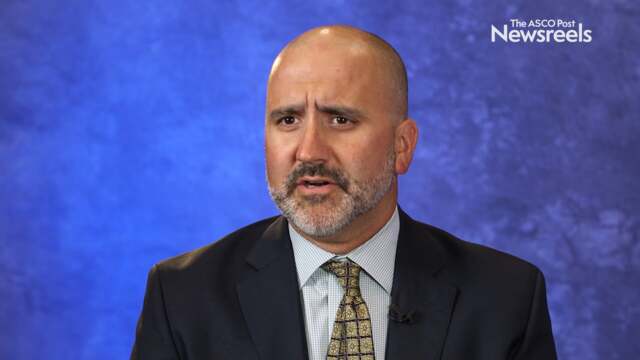Jeremy S. Abramson, MD, on Non-Hodgkin Lymphoma: Results From the TRANSCEND NHL 001 Trial
2018 ASCO Annual Meeting
Jeremy S. Abramson, MD, of the Massachusetts General Hospital, discusses study findings on lisocabtagene maraleucel in relapsed or refractory aggressive NHL (Abstract 7505).
Robert M. Jotte, MD, PhD, of Rocky Mountain Cancer Centers, discusses phase III study findings on atezolizumab plus carboplatin plus paclitaxel or nab-paclitaxel vs carboplatin plus nab-paclitaxel, as first-line therapy in advanced squamous non–small cell lung cancer (Abstract LBA9000).
Raymond U. Osarogiagbon, MBBS, of Baptist Cancer Center, discusses a kit used in non–small cell lung cancer resection that improves staging quality and overall survival without adding to morbidity of curative surgery (Abstract 8502).
Arnaud Méjean, MD, PhD, of the Hôpital Européen Georges Pompidou, discusses his study’s potentially practice-changing finding that nephrectomy is no longer the standard of care for patients with metastatic renal cell carcinoma (Abstract LBA3).
Toni K. Choueiri, MD, of Dana-Farber Cancer Institute, and Laurence Albiges, MD, PhD, of Gustave Roussy, discuss two treatment studies: one testing pegilodecakin with nivolumab or pembrolizumab and the other evaluating an oral CXCR4 inhibitor in combination with axitinib (Abstracts 4509 & 4510).
David M. O’Malley, MD, of The Ohio State University College of Medicine, discusses phase Ib study findings on mirvetuximab soravtansine, a folate receptor alpha-targeting antibody-drug conjugate, in combination with bevacizumab in patients with platinum-resistant ovarian cancer (Abstract 5549).





